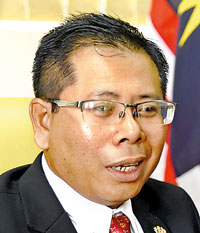Sunday Times 2
Malaysia offers its success story to Sri Lanka
View(s):Malaysia says it wants to take its relations with Sri Lanka to the next level, with increased cooperation in trade, investment, tourism, education and other areas. Malaysian High Commissioner Wan Zaidi Wan Abdullah said his country was committed to further strengthening the existing cordial relations between the two countries.
Addressing journalists at the Malaysian High Commission in Colombo, Mr. Abdullah said Sri Lanka-Malaysia relations reached the highest level of contacts when President Maithripala Sirisena visited Malaysia in December last year. His country was now keen to continue this momentum in relations with a visit of Malaysia’s Prime Minister Najib Razak to Sri Lanka sometime this year.

Malaysian High Commissioner Wan Zaidi Wan Abdullah
The High Commissioner said Sri Lanka was not a strange place for Malaysians who felt at home when they were in Sri Lanka because of many similarities in a socio-cultural sense. He said that Malaysian businesses had invested in Sri Lanka’s telecommunications, construction, education and tourism sectors and they wanted to venture into other areas such as health, the energy sector and agriculture, bringing in investments upto US$ 300 million. Last year, Malaysia invested 115 US dollars overseas; some of this money could come to Sri Lanka, the envoy said.
‚ÄúMalaysia has good private hospitals. Malaysia could provide training for Sri Lanka nurses and technical officers in Malaysia. Sri Lanka‚Äôs energy sector is being modernized and the visit of the president of Malaysia‚Äôs biggest energy company Petronas to Sri Lanka confirms the interest the Malaysian businesses show in this sector,‚ÄĚ the High Commissioner said.
He said Malaysian companies, including the state-owned Petronas, were interested in investing in a gas terminal in the Hambantota port and in power stations to be constructed and managed by Malaysians.
‚ÄúWe are promoting Malaysia as an education hub and we want many Sri Lankan students to pursue higher studies in Malaysia. We are also encouraging Malaysian education institutions to conduct degree courses in Sri Lanka in areas including engineering, business management, and hospitality.‚ÄĚ
However, he said Sri Lanka needed to ensure policy consistency, speedy procedures and one-stop solutions to attract more foreign investors. Mr. Abdullah said trade relations between the two countries were on an upward trend, and he urged Sri Lankan exporters to send more products to the Malaysian market so that Sri Lanka could achieve a favourable balance of trade.
Asked about the possibility of an FTA between the two countries, the High Commissioner said the proposal was on the table and the scoping of the agreement needed to be worked out.
The relations between the two countries would be further increased through exchanges of youth programmes and sporting contacts. The High Commissioner said Malaysia would also increase the intake of Sri Lankan workers to Malaysia. ‚ÄúSome 6,000 Sri Lankans work in Malaysia, mostly in service and manufacturing sector, while a few work in the plantations sector. We want to increase the number to 8,000 by the end of this year.‚ÄĚ
Mr. Abdullah said Malaysia wanted to invest in Sri Lanka‚Äôs agriculture sector too. ‚ÄúWe are looking at how this can be developed into commercially-oriented agro industries. We‚Äôre not looking at developing mature industries like tea and rubber, but we are looking at other areas with potential, like vegetables, fisheries and marine farming.‚ÄĚ
With regard to tourism, Mr. Abdullah said Malaysia was willing to share with Sri Lanka its formula for success through its ‚ÄėMalaysia Truly Asia‚Äô drive. He said the formula focused on integrated tourism promotions, with allied industries such as entertainment, culture and food and beverage sectors also being brought into the picture. He expressed optimism that such a programme together with effective marketing strategies could take tourism in Sri Lanka — which has several historical and leisure sites — to new heights.
He also revealed that the Malaysian company, Galaxis, was planning to set up a US$ 100 million theme park in Sri Lanka and had even identified a site for it.
On security cooperation, the envoy said the two countries were working together within the framework of bilateral and multilateral arrangements, with regard to combating transnational terrorism, drug trafficking and human trafficking. The two countries’ police forces maintain regular contacts, exchanging information and intelligence, he said.
On China‚Äôs One-Belt-One-Road project, the envoy said it was a good initiative since China is leading the world‚Äôs growth. ‚ÄúThe initiative is essentially economic, though some say it could be strategic. Countries like Sri Lanka and Malaysia in taking a decision need to ask themselves how much they would benefit by participating in it and how much they would benefit by not participating in it. This is the principal Malaysia applied when it acceded to the Trans Pacific Partnership (TPP) which is now in abeyance.‚ÄĚ

